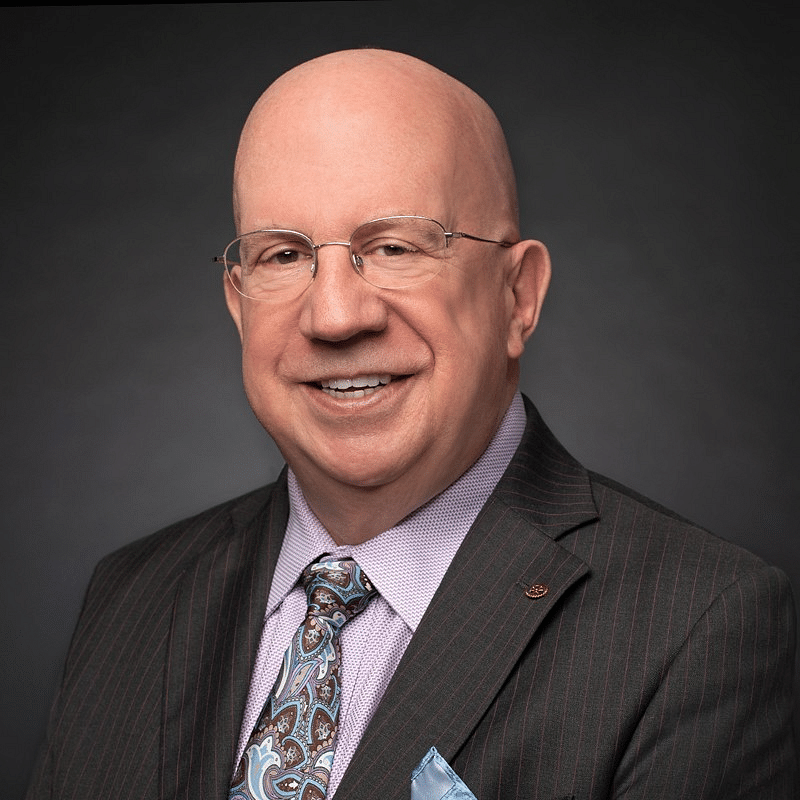
GetPayroll CEO Charles Read, 75, on keeping his business noticed in the digital age
By Jim James, Host of The UnNoticed Entrepreneur.
Charles Read has built a company called GetPayroll, which has over a billion dollars’ worth of payroll that they manage every year. In the new episode of The UnNoticed Entrepreneur, he talked about the business’s humble beginnings — originally with his wife, who was his business partner at the time — and how over the past 30 years, he built it up to be a national company serving other businesses with their payroll.
He also discussed issues such as loyalty and how he has a system to reward companies that give him referrals. He also shared one of the lessons he learned about getting professional staffing.
Image from LinkedIn
A Business Born in the Non-Internet Era
GetPayroll services clients across the United States, providing payroll compliance services. They pay their employees, do all the filings and tax payments, and solve all the compliance problems that arise. The Internal Revenue Service (IRS) makes millions of mistakes a year, so they fix them.
Charles built the business in the non-Internet era. And they did a lot of door-knocking, handing out brochures, talking to people, and attending network meetings. Most of these are no longer effective today. But these have built them a few local clients because they were local at the time, specifically in the Dallas Fort Worth area.
They moved into the Internet in the late ‘90s and became a national firm almost overnight. And it was a change because Charles had to have drawers full of state tax things that he needed to learn, alongside other things that went with the change.
Image from Pexels
Payroll is quite an intimate people-to-people business, even if it’s serving a customer that's a business.
In building their brand and relationships with customers, Charles and his team simply try to explain who they are and what they do — and not be like those faceless businesses like most of their competitors. And they make it a point to emphasise, “You could always call Charles.” Any of their clients or anybody interested can pick up the phone and call him directly. If he’s in the office, he’ll take the phone call
A major thing they focus on is that they are a small business dealing with small businesses. They’re not a faceless, huge monolith. If someone has problems, Charles, who is a compliance expert, a Certified Public Accountant (CPA), and (later) a US Tax Court Practitioner, will pick up the phone and answer their questions.
They highlight their compliance capability and that people can talk to the guy in charge if needed.
To Scale, Hiring Smartly is Vital
GetPayroll now has over 5,000 customers, and they’re giving 30-minute consultations. When it comes to scaling, Charles points out that he has a great staff. He gets very few phone calls because his staff is very effective and customer-oriented. They take care of the problems.
It’s very seldom that a problem has to come to his desk, and it’s because he hires good people. He hires competent people who do excellent work and have great customer skills — people who keep his clients happy and allow him to do his work.
Years ago, when he had been in business for seven years, he was at his wit’s end with the things that were going on. A friend gave him Michael Gerber’s “The E-Myth Revisited,” and he read it (Now, he buys the book by the dozen and gives it out to clients and potential clients. It’s also required reading for every new employee).
The book teaches entrepreneurs how to work on their business and not in their business. To grow an entrepreneurial business, they must treat it as a business, not a job. For any entrepreneur, it’s a key psychological point to say, “This isn't a job. This is a business. I need to manage the business.”

Image from Pexels
When it came to marketing the business, Charles thought he could market. He produced brochures, talked to clients, and wrote hundreds of articles. But about eight to 10 years ago, they had gotten big enough that he felt he needed to turn over marketing to somebody else. He didn’t have time and so he hired a Marketing Manager.
Within a couple of weeks, he realised he couldn’t market his way out of a paper bag. The Marketing Manager’s level of knowledge and expertise was so superior to his that it wasn’t in the same league. It was like putting a 10-year-old on a professional baseball field. Though they both played baseball, it was a whole different game.
He had delegated other things that he knew he needed people who were better or more experienced at it or had a better psychological tilt toward handling it, but he hadn't done that with marketing. And he realised that it was a mistake because it had kept them from being much bigger than they could have otherwise.
Into a Digital-Driven World
GetPayroll gets hundreds of leads from Facebook. They also get leads from LinkedIn, TikTok, Instagram, and YouTube.
Personally, Charles doesn’t understand social media. He doesn’t believe it, and he thinks it’s a farce. He doesn’t have a personal Facebook page because he thinks it wastes time. And he can’t believe people would be interested in what he eats, where he goes, and who he sees.
However, it does work. It’s been successful for his business. His videographer named Michael does wonderful videos. They also have their own YouTube channel, and they do serious and not-so-serious videos, including one about the Federal Unemployment Tax Act (FUTA).
For Charles, it’s a whole, brave new world and a lot of fun. He doesn’t understand much of it but has great people who do. Michael, for instance, produces many fun videos (Halloween videos and parodies of Star Wars, 2001: A Space Odyssey, and The Godfather). They also do educational videos and webinars for clients and potential ones.
They’re doing a lot of things that he never envisioned. But they’re effective because most of his clients aren’t his age. They’re younger than he is and live in a different world. He knows that their business needs to be in that world, and he needs people who are smart, experienced, and knowledgeable in that world.

Image from Freepik
An entrepreneur doesn't need to be the smartest person in the room. They need to hire the smartest person in the room. They need to delegate things to other people who can do better than them.
There will be core things that they probably do best, and they need to keep those. In Charles’ case, it’s dealing with the tax court, IRS, and other complex problems. Other than this, his job is to make his employees’ lives as easy and efficient as possible.
The more they can take care of clients and the more they can keep them happy — and the more work they can do and the more efficient they are — then the more they can grow even with the same salaries (which are rather very competitive, because Charles doesn’t try and underpay employees because it’s a mistake).
In sum, the job of the Chief Executive Officer (CEO) is to make the business better, not to do the work.
A Way to Incentivise People
GetPayroll has a referral program for their clients and anyone. If someone sends them a potential client that becomes a client, they get paid a percentage of the revenue. GetPayroll pays it on a residual basis. As long as that referral is a client, they get paid whether they still deal with the person or not.
GetPayroll treats it as a marketing expense. Currently, they’re paying out thousands of dollars a month in referral fees, which then generate tens of thousands of dollars a month in revenue.
For the program, they give referrers a particular site to go to and they will have their own page. If people put in their referral, it will be tagged for them forever.
In their business, they have a saying, “It’s never no. It’s just not today.” In connection with that, they do have clients who come back to them years later. There are referrals that come back years later and sign up.
The longest one was a gentleman and Charles has done work for his father about 14 years earlier. He called one day and asked if Charles still do payroll. Now, the business has picked up five large clients from that person. He’s a CPA and he brought those clients because he didn’t want to do payroll anymore.

Image from Freepik
They at GetPayroll are constantly talking to people and trying to set up referral partners. For example, they talked to an agent for Liberty National, who sells supplemental insurance to his employees. Now, they’re setting up joint marketing to market them to their clients and vice versa. At some point, Charles plans to go after every Liberty National agent in the country.
The business has also dealt with one insurance company and they currently have a number of their agents. He had his Marketing Manager go to Fiverr and for $50, he scraped every agent for that company in the US (about 12,000 of them). They put those in their email marketing system and picked up a dozen of clients already in the last three to four months from that.
Charles regards it as the best $50 he ever spent in his life because it’s bringing them hundreds of times that amount in revenue every year.
There was nothing nefarious or illegal in searching those information. The Pakistan-based Marketing Manager simply went onto the web, found those people, and assembled a list. He got paid $50 for his effort and has a system to do it.
Charles believes in email marketing. And it adheres to the above-stated saying (“It’s never no. It’s just not today.”)
It’s also why once they start talking to these people, they will keep talking to them. They send weekly emails, updates, information, fun things, and copies of videos. If they have 5 million emails, and one out of 100,000 is interested in changing payroll, it’s 50 leads. It’s just a matter of talking to that 5 million people to find 50 who are interested.
That One Thing That Didn’t Work for GetPayroll
Pay-per-click (PPC) doesn’t work for GetPayroll. They’ve tried it at least three times, and it’s been an abject failure every time.
People kept wanting them to do PPC, and they did it. They waited a few years, then restructured and tried it again. Yet it didn't work. Again, they waited a few years. They restructured it and tried it again with expert advice, but it didn't work. Though it may work for some businesses, it didn’t work in their case.
The thing about his hiring a professional Marketing Manager is that the manager could come up with all kinds of things. Some of which Charles thought won’t work, but they tried them because the manager was passionate about it. It’s his business and expertise. Some worked; some didn’t. Some of the things that Charles suggested worked; some didn’t.
The key is for entrepreneurs to try new things. Then for the things that work, they must pound on them and expand them. For the things that don’t work, they must try one more time; if they still don’t work well, they can put them on the shelf and try something else.
Image from Unsplash
When it comes to getting noticed and building the kind of brand loyalty that Charles plainly built for GetPayroll, it comes down to one thing. As there's no traffic jam on the extra mile, entrepreneurs must go the extra mile — for their clients and employees.
Their competitors won’t do that. And for the most part, entrepreneurs will be out there themselves. But it builds loyalty both with employees and clients.
Charles would rather have loyal clients because he can screw up with a loyal client, and they still won’t go away. If he pisses off a happy client, they’ll be unhappy and leave. Hence, it’s important to build loyalty, not happiness.
To find out more about them, visit www.getpayroll.com.
The UnNoticed Entrepreneur podcast is sponsored by Prowly, the all-in-one software for leveraging PR activities. Boost the media relations game for your business - get more coverage while saving time and money on everyday tasks.
This article is based on a transcript from my podcast The UnNoticed Entrepreneur, you can listen here.
Cover image by rawpixel.com on Freepik




